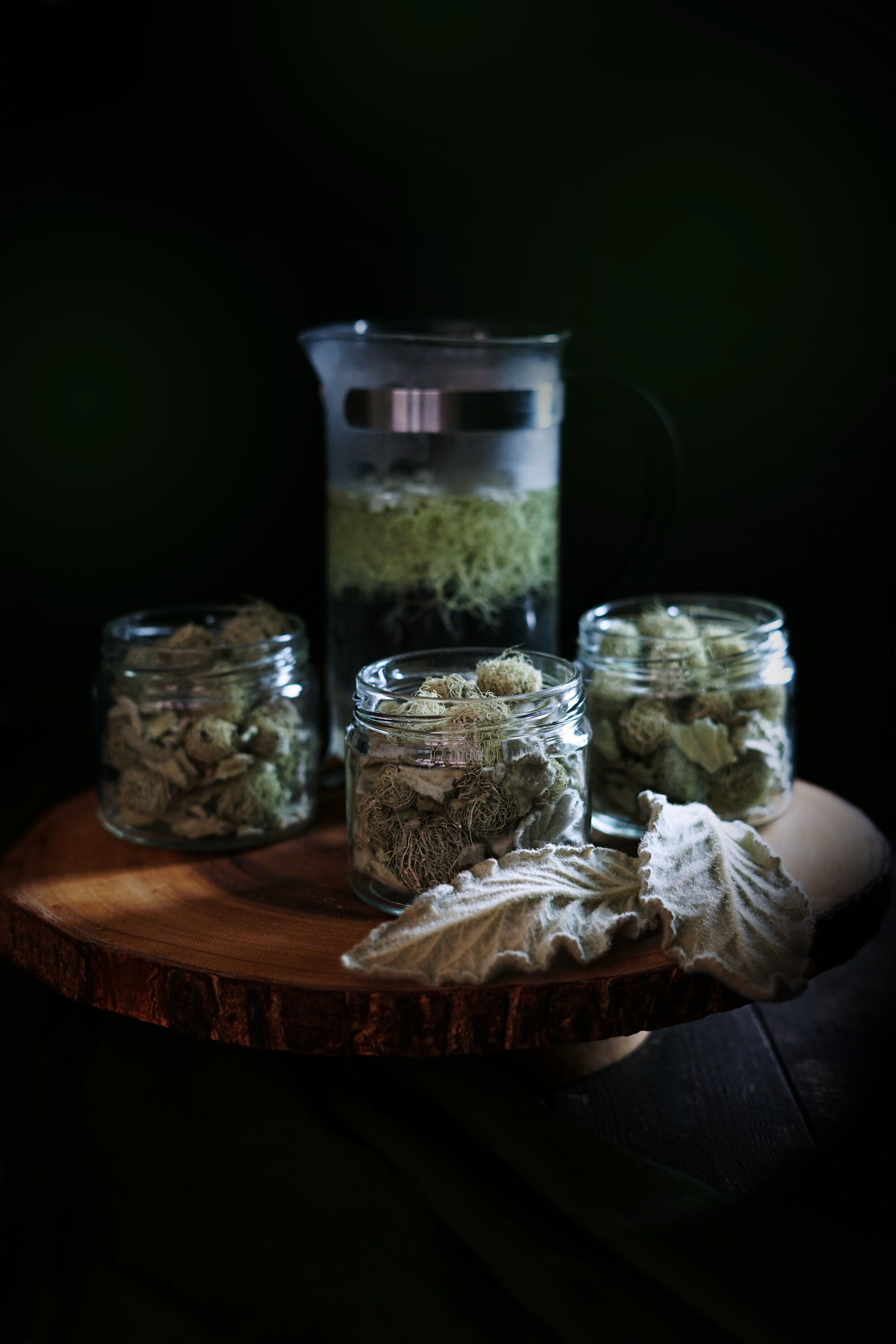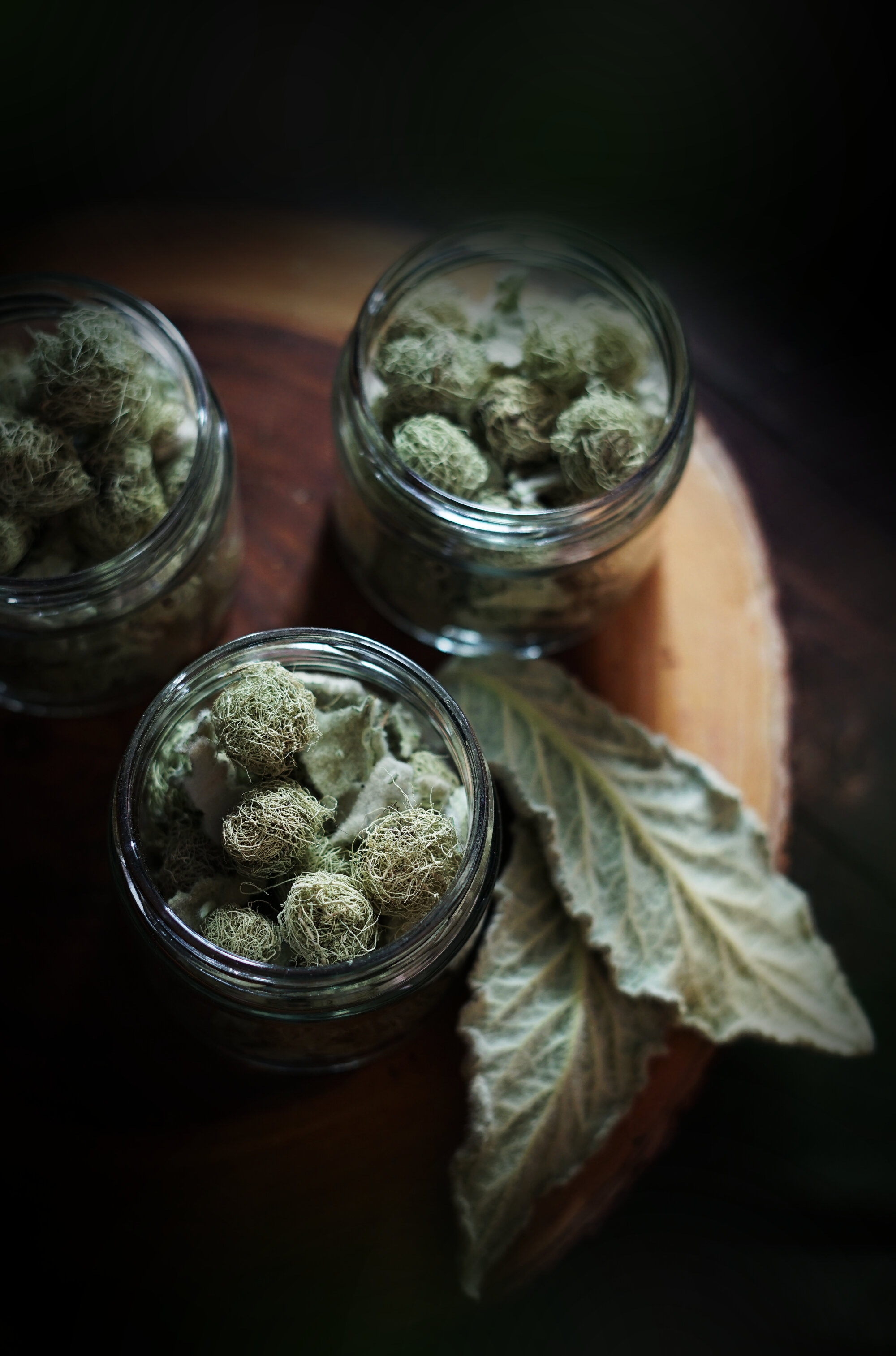Lungs of the Forest Tea: For Respiratory Ailments
As I sit in the silvery light of the full moon, I realize I can’t sleep until I write and share this post. The moon brings me insomnia but it also brings me comfort, a time of stillness and chance to check in with myself about what feels important. Right now, it’s herbal support for respiratory ailments.
This is a scary time to have respiratory ailments. I think often about my friends who have asthma or who are prone to pneumonia, as their risk for covid19 is much higher than average. That’s why I wanted to share two of my favorite respiratory herbs in a tea that is easy to blend and drink. I do want to emphasize something first, though: while this tea can be soothing and can definitely have an effect on lung function, it is not a substitute for medical care. If you feel short of breath or have a severe cough, you should definitely seek medical attention. This tea is not a cure for covid19 nor should it be relied upon to prevent it! If you have a mild case and feel safe staying home, this will bring you comfort. If you have a chronic respiratory ailment, drinking this blend regularly as a tonic can help fortify your lungs for if/when you do get sick.
Have you heard the saying “A breath of fresh air does the body good.”? I think of that sometimes when I’m driving up into the mountains with my windows down, breathing in the scent of damp forests and evergreens. It certainly lightens my mood, but it is also good for my lungs in a more literal way with the herbs I gather while I am there. Heading into the season of respiratory ailments, this simple tea blend is great to have around for coughs, chest congestion, and even asthma. It contains only two ingredients:
Mullein: I always think of this plant as “mama mullein” because its presence is so soothing to me. Mullein is one of the first plants to grow in disturbed soil (like a construction zone or burned area) and it helps prepare the scene for many more plant friends. With such soft leaves and deep veins, mullein turns dewdrops into sparkling diamonds. Mullein is a beautiful pioneer. But the most remarkable thing about this familiar plant is its ability to help with lung-related issues. The herbalist Darcy Williamson told me that she’s used rolled-up mullein leaves that are then smoked like a cigarette as an emergency stand-in for an inhaler for asthma attacks she’s witnessed whilst in backcountry expeditions where emergency care wasn’t possible. (Of course if you have asthma, you should definitely use your inhaler - this is for emergencies only!) Mullein is also a common addition to herbal smoking blends for its soothing nature. That said, you don’t have to smoke mullein to get its benefits; a safer way to consume it is to brew it as a tea and then strain really well through a clean cloth to ensure none of those little fibers get into your digestive system as they can be irritating. If you’d like to see a complete monograph about mullein, my friend Devon at Nitty Gritty Life has a great one. As she words it so perfectly:
“In particular, mullein is called for in chronic, sub-acute infections like a persistent or recurrent bronchitis, but some sources even call for its use with pneumonia and tuberculosis. This herb is especially useful for instances of a dry, hot and hacking cough with pain about the ribs. Perhaps nodding to its own soft fuzzy hairs, the herb is also indicated to increase the health of weakened cilia (the moving hairs of the lungs and respiratory tract) due to smoking and infection.”
Usnea: This silvery lichen is also known as “lungs of the forest.” I love foraging for usnea since the identification between it and similarly-colored lichens is so fun! True usnea has an itty bitty white elastic thread inside the lichen’s sheath. Gently breaking the larger fibers apart will reveal it, and it’s even more dramatic if the lichen is wet. Usnea also makes an excellent faux beard or mustache. ;) I typically find usnea in damp, clean environments. It’s fairly common throughout the West. When you do harvest, keep in mind that lichens grow very slowly, so try to only use lichens that have fallen to the ground on broken branches. If you do harvest from the trees, do so carefully and sparingly. And why would you want to forage it in the first place? It’s a wonderful support for respiratory ailments too. Its constituents are alcohol-soluble, so the most potent preparations of usnea are tinctures. That said, it’s still effective in tea as well! Once again, Devon has a great monograph for usnea too:
“Although usnea is also considered a tonic, this lichen is an infection fighter, plain and simple. Unlike most modern antibiotics which disrupt the structure of a cell, this lichen prevents the metabolism of gram positive bacteria such as Streptococcus, Staphylococcus, and Mycobacterium tuberculosis. It is particularly effective for hot, irritable, wet coughs.”
Directions: Blending these two foraged ingredients together creates a great tonic for respiratory ailments. First, make sure both are completely dry. I like to roll the usnea into little balls so it mixes in with shredded dried mullein leaves a little more neatly. The resulting tea has a strong earthy flavor, so feel free to add in some other flavors as well! I would recommend mint (for soothing the stomach), elderflower (for reducing the temperature of a fever) or chai spices (because they are warming and taste delicious!) To brew, cover about 1 Tbs. of the mixture in boiling water and steep for 10 minutes. Strain well through fabric to remove any hairs, then re-heat and stir in a little honey (optional.) Sip slowly and picture all of that foresty fresh air goodness heading down to your lungs as you drink it. This tea can be drunk regularly through the season to act as a tonic for those with asthma or chronic respiratory ailments, or it can be consumed at the onset of respiratory complaints like coughs.
I hope that wherever you are right now, you’re bundled up all safe and cozy and doing your best to stay safe and healthy. May the moonbeams wash over you with comfort and clarity and a gentle reminder that you are never alone.
Love what you’ve read here? Don’t forget to Subscribe to get frequent updates of new posts!
Huge thanks to my Patrons that make sharing all of these lovely posts with you possible (without all of the pop-ups and ads that make browsing other blogs so annoying). If you’re feeling generous, you too can support the wonder with a monthly contribution of your choice. Even $1 helps a lot! Your donation will help to fund this blog as well as my surprise free events and gifts for strangers. Learn more about this program at the link below:



















Join me for a little winter night magic as we bake this cake full of rich seasonal flavors and black cocoa!